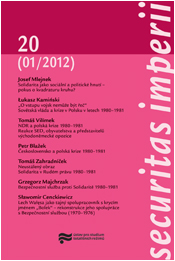NDR a polská krize 1980–1981 Reakce SED, obyvatelstva a představitelů východoněmecké opozice
The GDR and the Polish Crisis, 1980–1981. The Reaction of the SED, the Population and Representatives of the East German Opposition
Author(s): Tomáš Vilímek Subject(s): Politics, Government/Political systems, Post-War period (1950 - 1989), History of Communism, Socio-Economic Research
Published by: Ústav pro studium totalitních režimů
Keywords: GDR; SED; Poland
Summary/Abstract: The leadership of East Germany eyed developments at the turn of 1980 and 1981 with considerable disquiet and attempted by all means possible to prevent the socalled Polish bacillus from negatively influencing the situation in the GDR. Erich Honecker was among those who advocated a tough policy towards the Polish leadership, although he was forced to accept the position of Leonid Brezhnev, who unequivocally preferred the announcement of a state of emergency and regarded a military intervention on the part of selected Warsaw Pact countries (CSSR, NDR, USSR) as the most marginal of scenarios. The Polish crisis carried great weight for East Germany for a number of reasons. Apart from the fact that it threatened the positive results of the foreign policy of the 1970s, during which the GDR had succeeded in greatly boosting its political position abroad and improved relations with the Federal Republic of Germany, strikes in the People’s Republic of Poland caused marked delays in the deliveries of the black coal that was extremely important for the East German economy. However, the Polish crisis also impacted the domestic political situation because, particularly in the initial period lasting from September to October 1980, Polish workers’ demands for independent unions were seen by their East German counterparts as justified, and the East German State Security had to deal with several instances of solidarity with Solidarity, most often in the form of slogans on walls and fliers. Despite the fact that in the subsequent period the prevailing mood in East German society was one of concern that an escalation of the crisis could harm a promising development in relations with West Germany and in the final result lead to a marked hardening of the East German regime, the ideas of Solidarity did meet with considerable welcome among the opposition in the NDR, which what is more had been monitoring developments in the People’s Republic of Poland along with events in Czechoslovakia, Hungary and the Soviet Union from the mid 1970s on. Many representatives of the East German opposition – including Roland Jahn, Wolfgang Templin, Robert Havemann and Ludwig Mehlhorn – rated the activities of Poland’s Solidarity very highly and in the following period also attempted to use certain outside impulses to adapt their own aims.
Journal: Securitas imperii
- Issue Year: 2012
- Issue No: 20
- Page Range: 44-57
- Page Count: 14
- Language: Czech

